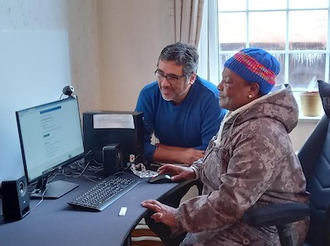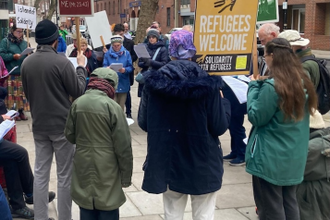A 'Preferential Option for the Migrant'

Mauricio at Fatima House, Birmingham
A Columban lay worker who works with migrants reflects on Church response to their situation in World Refugee Week.
Undoubtedly, migration has become a central issue in current political and economic narratives in the UK and elsewhere. Correspondingly, the Church's work among migrants has become more intense and intentional over the past few decades.
This work has been carried out at first by countless lay and religious (precisely where communities became the recipients of waves of migration) and most recently, by Church leaders making of it an institutional pastoral priority.
The way that Pope Francis has addressed the rights of migrants in official pronouncements and actions, reveals that he sees migration as an urgent locus for mission. Mission - understood as a cycle of intentional and effective engagement and reflection on contemporary issues- seems to have found in the issue of migration its XXI century leitmotiv.
I would like to see here a parallel with the historic attention the church started to pay to the so called 'social question' at the end of the XIX century. This awareness acted as the springboard for the development of a more consistent - and somehow cohesive - Catholic social thinking and action on issues related to that complex relationship between capital and labour: the dominating concern in socioeconomic discourses at the time. The engagement with that social question eventually led to the emergence of liberation theologies in diverse contexts and corners of the world. These are the theologies that have sustained and nurtured the Church's action and reflection among the vulnerable and that have translated into intentional action its 'preferential option for the poor.'
As we travel onto the third decade of the XXI century, I see the Church confronted with a new emerging 'social question' which could be called the 'migrant question.' This question - mirroring the issues raised by Pope Leo XIII in 1891 - can be also characterised as both complex and urgent. On the one hand, it is inextricably linked to ecological, economic, and political issues; on the other, it requires urgent attention because its deep existential dimension: millions of people on the move today are being denied their basic human rights. Following Pope Francis' invitation to see Migration as a locus for mission today, it could also be said that for current liberation theologies, there is a need to uphold a 'preferential option for the migrant.' But what does this mean?
Columbans - always working in partnership with like-minded people and organisations - have engaged for decades in seeking and offering a meaningful response to the issues of migration in Britain and elsewhere. In responding to it, they have met the complexities of a ministry among migrants.
In Birmingham for instance, Columban volunteers, missionaries, and co-workers both lead and support projects which help asylum seekers and refugees. With the intention to empathise with this reality, my family and I have moved into 'multicultural areas,' where waves of refugees and other migrant groups are constantly arriving. In those areas, we have gained first-hand experience of those complexities.
In addition to the political hostility experienced by most refugees while processing their asylum claims, those who eventually gain protection find themselves living amongst communities stricken by underfunded services, poor accommodation, lack of green spaces, elevated levels of crime, unprotected employment, and so on. These are the communities that are handed down the challenging task of welcoming refugees.
From a missionary's perspective, refugees usually arrive at areas in which Christian communities are 'in retreat': shrinking congregations, with a focus on maintenance, struggling financially and crucially, with little or no ability - and/or willingness- to syntonise and engage with the demands of living interculturally. But there is always hope and although it may sound paradoxical, in a 'preferential option for the migrant' may lie an opportunity of enrichment for these ailing communities.
Through the years I have learnt of numerous examples of parishes across the country, which confronted with the arrival of large numbers of migrants, have made this option. Some have adjusted their liturgies/celebrations to make them less monocultural; others have reached out to refugees with concrete help and assistance; while others have made church property available to offer accommodation to destitute migrants. This is all positive, but we must not forget that an option for the migrant can be much more than a 'pastoral strategy.'
The mere experience of a migrant can help communities glimpse core qualities of Jesus' Kingdom: the seeking of sanctuary; the meaning of being pilgrims; the ability to become vulnerable and being a guest of the unknown; the perspective from the margins; the unconditional trust in God and so much more. Listening to the experience and journeying with migrants can lead our churches to real faith enrichment.
In my ministry among migrants and refugees I am always reminded of theologian Jon Sobrino's remarks that the 'God of Jesus is the God of preference towards victims.' Today in the UK, and many other places, people on the move are the main victims of a faltering socio-economic system colluded with hostile political policies and practices. Amid our many crises today, God speaks through migrants. Let us listen.
Mauricio Silva in the Columban Interreligious Dialogue Coordinator in Britain. He came to the UK as a missionary with his wife Nathalie and children in 2001. He coordinates Fatima House in Birmingham and ministers in various projects supporting asylum seekers and refugees across the West Midlands.


















